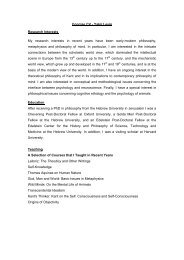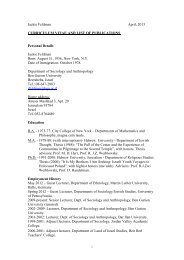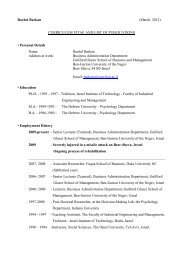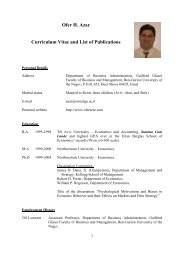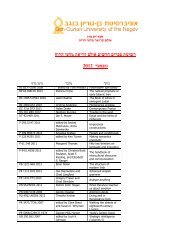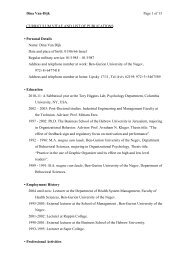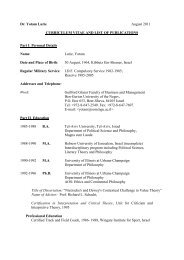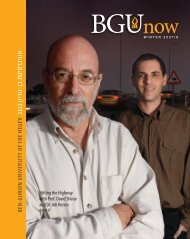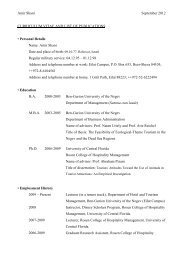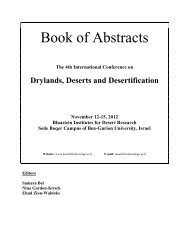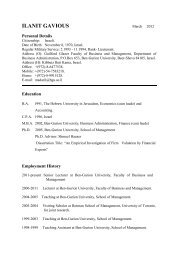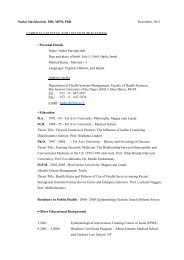cover 2006
cover 2006
cover 2006
Create successful ePaper yourself
Turn your PDF publications into a flip-book with our unique Google optimized e-Paper software.
that will enable future cooperative<br />
environmental work for the benefit<br />
of the entire Middle East, but these<br />
programs work towards peace, too.<br />
Because we use the environment<br />
and not peace as our primary<br />
ingredient, we are able to<br />
accomplish much more when it<br />
comes to the peace element.”<br />
Tal also co-founded EcoPeace,<br />
now known as Friends of the Earth<br />
Middle East. In 1998, he was elected<br />
Chair of Life and the Environment,<br />
Israel’s umbrella group for<br />
environmental organizations. In just<br />
a short time during his tenure, the<br />
organization grew from 24 member<br />
groups to 80. He also serves on the<br />
Board of Directors of the Jewish<br />
National Fund.<br />
As if all that weren’t enough, Tal<br />
spent 15 years teaching<br />
environmental law at Tel Aviv<br />
University. “I wasn’t sure I wanted<br />
to be involved in the academic<br />
world,” Tal says. “I’m an activist.<br />
My field is public policy. Although<br />
I’ve always been involved in<br />
research, I had the idea that<br />
academics were not always fully<br />
engaged in world problems – and<br />
real problems are what I love best.<br />
But BGU offered me a great<br />
opportunity, the best of both worlds.<br />
I’m teaching, I have a vigorous<br />
research agenda, but I’m also<br />
intensely involved in public policy<br />
– the Ministry of Environment or<br />
Israel’s Knesset is my lab. For me,<br />
this is ideal.”<br />
Tal’s current research focuses on<br />
water management and stream<br />
restoration, evaluation of<br />
environmental education and<br />
desertification policies. A member<br />
of both the Mitrani Department of<br />
Desert Ecology and the Department<br />
of Man in the Desert at the Jacob<br />
Blaustein Institutes for Desert<br />
Research, Tal represents the<br />
Blaustein Institutes on a number of<br />
international committees.<br />
Last January, Tal – sometimes<br />
referred to as “Nature’s Lawyer” –<br />
was awarded the prestigious Charles<br />
Bronfman Prize in recognition of his<br />
work “to advance the environmental<br />
movement in Israel and the Jewish<br />
world.” The Bronfman family noted<br />
Tal’s uniqueness: “He’s an<br />
outstanding environmental<br />
visionary who set out to change the<br />
world and has actually done so.”<br />
Environmentalism in Israel differs<br />
from that in the US, Tal says. "One<br />
of Israel’s distinguishing<br />
characteristics is our technological<br />
optimism. We’re big advocates of<br />
innovations like drip irrigation to<br />
preserve water or using forests to<br />
control desertification while offering<br />
recreation at the same time. Our new<br />
desalination plants are straight out<br />
of science fiction. But ultimately,<br />
technology can only go so far. At the<br />
center is the essence of who we are,<br />
of identifying the things that give<br />
meaning and value to our lives.”<br />
“My family was very Zionistic,”<br />
he says. “When I was 20, I had my<br />
Bachelors degree and I enlisted in<br />
the Israel Defense Forces. It was<br />
during the years that I served as a<br />
paratrooper that I began to focus on<br />
the environment as the place where<br />
I could make the greatest<br />
contribution. When you’re a soldier,<br />
you get a very different view of the<br />
world and one of the first things that<br />
began to bother me was litter. There<br />
is something of an insouciant<br />
attitude among many Israelis – the<br />
paradox of apartments being so<br />
clean you can eat off the floor, but<br />
outside, on the stairs or on the<br />
streets, they throw trash right on the<br />
ground.<br />
“I think it’s really a matter of<br />
education. In all the years I've been<br />
The environment isn’t a spectator sport, we need players<br />
involved, I’ve seen that Israelis care<br />
deeply about the health of their<br />
communities. They love this land.<br />
When we learn to tap into that love,<br />
we can succeed – it’ll be just like the<br />
Wildflower Campaign of the 1960s.<br />
Forty years ago, all of Israel’s<br />
wildflowers were disappearing –<br />
people were picking them. So a huge<br />
‘Wildflower Campaign’ was started,<br />
with a message aimed primarily at<br />
children: ‘Don’t pick the flowers’. It<br />
worked – now, no Israeli would even<br />
think of picking a wildflower. They<br />
learned it as children and they didn't<br />
forget. We have to do the same thing<br />
again with other major<br />
environmental issues – air pollution,<br />
open space, the lack of urban<br />
planning, water quality.”<br />
Even for a powerhouse like Tal,<br />
turning the ship of the Israeli state<br />
in a completely different direction<br />
sounds like a gargantuan task. “It<br />
may be, but you have to do what<br />
you can. This is life. You don’t get<br />
dress rehearsals.”<br />
BGU NOW 15



